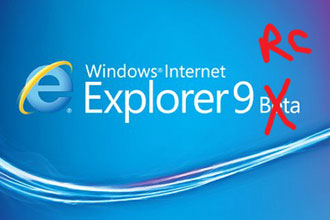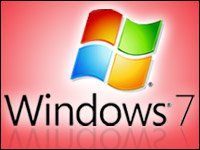
I’m writing this at the IE9 launch, which happened last Thursday, and this morning I had an epiphany. Don’t worry — I’m pretty sure my meds will kick in momentarily, but until they do, it strikes me that with all the focus on innovation and Apple, Apple doesn’t really innovate that much. What it does is focus and out-execute every company it competes with in most every product. One exception is Safari; Microsoft, the Mozilla Foundation and Google regularly kick Apple’s butt.
Last week, HP launched its TouchPad tablet, which comes about the same time in the iPad’s career as HP’s unborn MP3 player would have arrived a decade ago, and it will likely showcase how HP might have done. The prognosis is not good, and it isn’t because the TouchPad isn’t innovative — it is because HP is executing poorly.
Let’s talk about the importance of execution against a product that competes well against Apple — IE — and one that is trending to be a failure: the HP TouchPad. Since the IE9 release candidate represents an example of excellence, I’m going to make it my product of the week.
Innovation vs. Execution
At the beginning of the PC’s reign, the initial big innovation didn’t come from Apple or Microsoft — it came from Xerox and IBM. Xerox PARC was where Apple got the idea for the Mac, and while Microsoft saw the Xerox stuff as well, its initial inspiration seemed to come as much from Apple.
That initial innovation did nothing for Xerox, and Microsoft rapidly passed Apple. This had nothing to do with innovation — it had to do with the quality of execution. Xerox didn’t execute at all, while Microsoft under Bill Gates took around five years to out-execute Apple.
Fast-forward to the 90s. Apple had the incredibly innovative Newton, but it was Palm that developed the idea into a very successful product, and here Microsoft was an also-ran. Last decade, while S3, Creative Labs and Sony had the innovation, it was Apple’s execution on the iPod that resulted in its owning the market.
It didn’t even have the most attractive product, and its price was more than double much of the competition, but it recognized that it was ease of use that was the big differentiator — and with iTunes, basically cornered the market.
The strongest competitor was Zune, an innovative and differentiated product, but Microsoft under-executed in product design and marketing, and it over-emphasized a unique feature, sharing, that couldn’t surface unless Zune became dominant — and it never did.
On the iPhone, the first product I ever saw that met the concept was the IBM Simon, but Philips also had a prototype that was even more advanced and similar in size and anticipated capability to the iPhone more than five years before the iPhone launched.
The LG Prada, which is almost a twin to the iPhone in hardware, launched the year before the iPhone did and Microsoft had the Windows Mobile platform in market years before Apple. None of this mattered. The Simon failed, the Philips products were never launched, and Microsoft simply didn’t complete the idea. Apple completed the concept and brought a product that was fully conceived to market, and the others didn’t.
On the iPad, Microsoft was first twice: with the Windows tablet and with Origami, which showed that it clearly got that the Windows UI wouldn’t work, and what was needed was a lighter, cheaper and more content-oriented product. Origami was released unfinished, and instead of cornering the tablet market Microsoft is playing catch-up. It likely won’t have a truly competitive product in market until 2013, which could be too late.
HP TouchPad
One of the advantages of coming late to market is you can learn from the folks who came before. The iPad has a number of shortcomings, and the Samsung Galaxy tablet — the strongest competitor in market to date — is estimated to have sold 250,000 to customers out of the 2,000,000 that were shipped to stores last year. In short, you can learn from the mistakes of others and should position against the weaknesses of the leading competitor.
The lesson is that an “almost iPad” won’t sell in significant volumes and that Apple’s weaknesses are in business, security, outdoor viewability, and a Model-T level of product choice (you get a choice of one design). Strengths are clearly on form factor, marketing, content (particularly music), name, applications and market share.
HP is stronger on security and business than Apple is, and it has an outdoor-viewable display technology in its Lab that it uses for military engagements. HP has a history of failed products in the CE space, including its media center, media server, cameras, TVs, GPS systems, phones, iPods (yes there was an HP iPod), Voodoo computer, Black Bird, Fire Bird, Graphite Envy and PDAs. This is an impressive and rather sad list, and one that isn’t easily matched in the segment.
On what was a lengthy, poorly focused early launch, HP missed on name, (“touchpad” is the name of the mouse replacement on notebooks), focused on music with Beats sound (Apple strength), wasn’t funding development adequately, didn’t have any depth of business content, had no outdoor-viewable display, and had a choice of one product — with actually fewer choices than Apple.
HP even attempted to steal Microsoft developers with the promise that they could develop for webOS instead, which probably won’t sit well with its one remaining large partner. It will even ship after the iPad 2 starts selling in stores in April, making it late to market. It is therefore likely to follow the other expensive HP duds into failure, unless the company substantially ups its game.
Wrapping Up
For Apple, HP and Microsoft, execution is critical. I mention Apple, because Steve Jobs has been key to Apple’s execution. Without him, there was no drop in innovation — in fact, Apple probably tried more things when he was gone. However, with him, the company focused, finished products, and executed strongly around them. That may get lost with his departure.
For Microsoft and HP, it isn’t good enough to toss products out to market and look really busy — they have to execute at a level that ensures success. HP does that with printers and many of its enterprise offerings, Microsoft did that with Xbox Kinect, IE9, and many of its enterprise products.
All three of these companies can execute, but only Apple is consistently executing, and that is why Apple is so highly valued by investors and customers. In the end, innovation only represents an opportunity — execution pays the bills. The Microsoft IE team did; the HP TouchPad team did not.
Product of the Week: IE9
 IE9 is one of the products that Microsoft has executed on very well. From improvements to security limiting dramatically how others can track you on the Web, to geolocation that provides content based on where you are, to the big one — performance (it is up to nine times faster than alternatives — this product demonstrates what Microsoft is capable of when it focuses and finishes.
IE9 is one of the products that Microsoft has executed on very well. From improvements to security limiting dramatically how others can track you on the Web, to geolocation that provides content based on where you are, to the big one — performance (it is up to nine times faster than alternatives — this product demonstrates what Microsoft is capable of when it focuses and finishes.
Developers at the launch events have been very excited about this product, and it reverses nearly a decade of less-than-stellar execution on what remains a keystone application for Microsoft.
 My new favorite feature is the one The Huffington Post showcased with its news sites that lets you pin topic areas to your command bar and see on the bar when an item has changed. This is vastly more useful and less annoying than email.
My new favorite feature is the one The Huffington Post showcased with its news sites that lets you pin topic areas to your command bar and see on the bar when an item has changed. This is vastly more useful and less annoying than email.
IE is one of the few products that even Apple has had trouble competing with, and apparently more than 70 developers are focused on IE9 and its unique capabilities, although the product hasn’t even officially launched yet — it is just beginning its release cycle.
Product presentation is less a boilerplate on why Microsoft should be successful — a mistake that HP made at its launch — and more about the product and the experiences you’ll have with it.
In other words, it seems someone actually learned that at a product launch the product should be the star, and IE is the star today and is only sharing that star status with application developers.
Because I believe that if Microsoft put this level of focus on other products it would be vastly more successful, IE9 is my product of the week. Oh, and it is free!
























































The same argument applies to facebook too. I think IE 9 could have the document viewing feature as http://bing.elookinto.com. But again, features may be not important at all these days.
The author talked about "execution". What are you trying to argrue here?
I don’t disagree with the author regarding his comments on execution. But the title is about Innovation (not mattering), which I was commenting on. Innovation certainly does matter. In fact, innovating products that people actually want or need is a most important thing for a technology company. Otherwise, why compete? Just sell what others make! Microsoft has a long history of not providing what people would rather have, just the basic applications that people need.